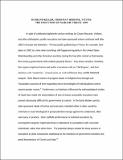Husband-Killer, Christian Heroine, Victim: The Execution of Madame Tiquet, 1699
Author(s)
Ravel, Jeffrey
DownloadRavel_scfs_revised.pdf (311.6Kb)
OPEN_ACCESS_POLICY
Open Access Policy
Creative Commons Attribution-Noncommercial-Share Alike
Terms of use
Metadata
Show full item recordAbstract
The case of Angélique-Nicole Carlier Tiquet, convicted of organizing a plot to assassinate her husband in 1699, prompts questions about histories of torture and public execution over the last several centuries. During the two-month trial that followed the assassination attempt against her husband, official inquiry and public opinion coalesced around the idea that Madame Tiquet was guilty. At least some observers came to believe that her crime represented a threat to husbands and paternal authority more generally throughout the kingdom. In the wake of her torture and public execution, which she endured so gracefully that many observers found themselves lamenting her death, male Catholic polemicists argued in print about the meanings of her demise, while one female Protestant writer, Anne Marguerite Petit du Noyer, asserted her innocence. Several years later, in the 1702 edition of his Dictionnaire historique et critique, Pierre Bayle cited the case in the context of a broader secular reflection on marital relations in morally corrupt societies. The affair that prompted these texts is fascinating precisely because it resists insertion into misleading histories of progress and civility, or ever-expanding statist surveillance of citizens.
Date issued
2010-12Department
Massachusetts Institute of Technology. School of Humanities, Arts, and Social SciencesJournal
Seventeenth-Century French Studies
Publisher
Maney Publishing
Citation
Ravel, J. “Husband-Killer, Christian Heroine, Victim: The Execution of Madame Tiquet, 1699.” Seventeenth-Century French Studies Volume 32, Number 2(2010): 120-136.
Version: Author's final manuscript
ISSN
0265-1068